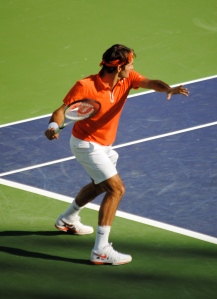I recently* fulfilled a longtime dream: watching, in person, a match featuring Roger Federer. Federer is the tennis equivalent of Michael Jordan, Michael Schumacher, Pele or Babe Ruth, in their respective sports. In tennis, Federer is almost universally considered the Greatest of All Time; he is, as they say, the GOAT. In a sport where competition for the #1 rank is fierce, he held the top spot week after week, for four and a half years. (And he only dropped to #2 because he encountered a younger, left-handed Spaniard who, it turns out, is the greatest clay court player of all time.) Federer holds almost every record, and if that isn’t enough, he speaks four languages including perfect English even though it’s not his first language. But what I find most unique about him is something else: the way he moves on the tennis court.
Some commentators have said he performs tennis ballet; I agree. When he moves, his hands, feet, head, torso, legs and neck move in harmony, seemingly with only the tiniest of effort or exertion. He is always balanced, composed, ready. His
movement is the epitome of efficiency: nothing is extraneous. He doesn’t use the standard wind-up to the serve that most players do. He doesn’t bounce the ball 20 times like Novak Djokovic. He doesn’t tug at his shirt or shorts like Raphael Nadal; he doesn’t have special rituals or nervous tics. He doesn’t even sweat, or so it seems. There’s a rhythm, a geometry, to his movement which commentators have actually diagrammed on dry eraser boards. Every match, he plays with grace.
Then there’s the way I play tennis: off-balance and inconsistent. My success does not come from harmony, rhythm or balance. I muddle through and scrap for every point. I expend effort, I sweat. A lot. My feet do not always work in tandem. When I bounce the ball before serving, it doesn’t always go where I want it to.
Although it’s not an official diagnostic characteristic, I’ve read that many Aspies have poor motor skills and an unusual gait. Some studies point to poor muscle tone. My deficit in this regard wasn’t so severe that I couldn’t use pen or pencil (although my handwriting was, and is, as bad as any doctor’s). But it was certainly a deficit, and I was aware of it.
While this may seem a non-sequitur (and maybe it is — I have Asperger’s, after all), I see parallels between poor motor skills and poor social skills. Both require a type of instinctual dexterity. Most people take for granted the ability to carry on a conversation. It comes naturally to them. They don’t need to think, ok, first I should ask the other person how he’s doing, then transition to an interest of theirs, talk about myself, ask about gossip, all the while glancing, but not staring, at the person’s face.
But that’s how it often is for me and I suspect other Aspies. I have to diagram the conversation in my head, at least much of the time. I have to think of contingencies — what should I say if there’s silence? What is appropriate and not appropriate to talk about? And during the conversation, I wonder if I’m talking too much. Is their body language — a strange term for us literal-minded Aspies — communicating that they’re interested in what I have to say, or that I’m putting them to sleep? Maybe they’re signaling they don’t want an exegesis about string tension used on tennis racquets and how it must be modulated for the stiffness of the racquet and the material of the string. Maybe?
Turning back to sports, for an Aspie they are a mixed bag. Sports often mean jocks, who, before, during and after the game engage in banter with their teammates. Actually, “banter” is probably too soft a word — it’s often more like verbally and physically abusing each other. (Especially anyone who would use the term “banter.”) So Aspies are disadvantaged in this forum by physical AND social awkwardness.
On the other hand, if you can get past the motor deficiencies, sports provide structure and rules. You know exactly what is allowed and not allowed, what causes a “foot fault,” when a ball is “out,” how to keep score, who serves and who receives. For that reason, I was often happiest as a kid playing tennis and other sports. There’s a calming, zen-like quality to physical activities that are governed by rigid rules and require single-minded dedication, and for which one is rewarded based on objective criteria.
But if I’m honest, I harbor the hope that one day, I’ll hit a shot, just once, as beautifully as Roger.
* I’m using the term “recently” somewhat loosely; much time elapsed between writing and publishing this post (I wasn’t at the French Open, unfortunately).
** Both photos were taken with a Nikon D3000, Nikor 55-200 f/4-5.6g VR zoom lens.




I like that parallel, and the expression “instinctual dexterity”.
HI again! Just a quick note… I can be clumsy like many Aspie’s, sometimes don’t seem to be aware of the posture I’m adopting, why I’ve been in physio for so long, proprioception is weak. However, I can deak around things like nobody’s business, don’t know why. Also, I am exceptionally good at throwing and catching a ball, for a girl, but maybe even for a guy. And interestingly, my son (who also has Asperger’s) and my daughter (who might have it as well), have inherited my skill. In fact, my son, at 6 months old, threw a ball right at my face, hitting me square. And then did it again. Sometimes a special skill might manifest itself in a physical way? 🙂 Having said all of that, in every other area, my son is lacking in physical coordination, has a very awkward running style, my daughter, not so much. And I come from a family of provincial and olympic athletes, so maybe that’s why.
I definitely identify with you about posture! I’ve come to realize that posture communicates so much to others. The guys who walk around ramrod straight give off a vibe of extreme confidence. I, on the other hand, have to often remind myself to stand up or sit up straight. (And being tall, slouching is especially bad for my spine.) I’ve done some meditation, and listened to teachers like Gil Fronsdal, which has given me better body awareness. For example, I’ve been noticing that my shoulders are tense, especially in the office, and have to remind myself, shoulders down. It works … for at least an hour or so.
Proprioception — such a great word! I like how it sounds; it reminds me of perspicacity, which, for many years, has been one of my favorite words. I too suffer from poor proprioception. My daughter, who has some Aspie characteristics but I don’t think has Asperger’s, often trips and bumps into tables and other objects (jokingly claiming the inanimate object “hit her”). But otherwise, she’s pretty athletic.
It’s interesting that your family shares a talent for throwing and catching. It’s one of my best skills too, believe it or not — baseball was always my most successful sport. (I even made the all-star team one year, when I was 14 — an accomplishment I still cherish!) Perhaps you’re on to something. I’ve tried to think of what would distinguish throwing/catching from other aspects of sports but nothing comes to mind. Could be a good research topic …
P.S. The gentleman who wrote the book I recommended also had a skill at throwing a baseball… kinda weird!
The gentleman who wrote Asperger’s from the Inside Out noted that it was the rhythmic throwing that soothed him, and I agree. A very simple task, with but one aim. Not a complex sport, and if it is soothing, then perhaps Aspergians will do it often, and practice makes perfect? 🙂
Makes perfect sense to me. That’s one reason I like tennis, I think, and especially hitting groundstrokes — there’s a rhythm to the ball being hit back and forth, an inevitability. But in game situations, I sometimes struggle because there’s so much variation and complexity. I suspect that’s true of almost everyone who plays, but I think Aspies have it worse.
It is true. I am a tennis player also, and I struggle in game situations. I do not play dobles because i get over stimulated. However the rhythm of hitting ground strokes , or serving a basket of balls with the same motion all the time is an amazing feeling. I was diagnosed with ASD last year . Tennis is my obsession.
Welcome ICS! Greetings from one tennis obsessed to another …
Doubles is challenging for me too, I think because it requires so much communication between teammates. When I play, I often feel like I’m letting my teammate down. But at my age, most people want to play doubles, so that’s mostly what I play nowadays. But I guess I approach it like a singles player, because I often stay on the baseline.
Thanks for commenting–
UA